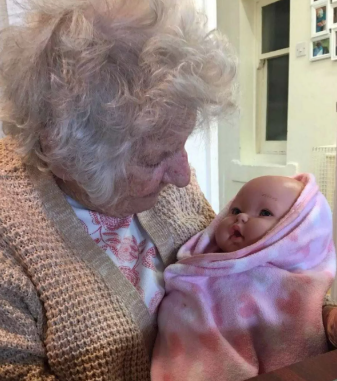
“Have you ever seen someone with dementia holding a doll?”
Such questions to the Dementia Institute are not uncommon. What they’re typically getting at is: “Does it seem right? Does it work? Why would an 85-year-old woman want to play with a doll?”
I will admit that one of the first times I saw an elderly woman carrying a doll, I was taken aback. However, it didn’t take long to see how carrying—and caring for—a doll was a purposeful and meaningful activity for someone living with dementia.
This approach is not without controversy. In a recent New York Times column “These Settings Aren’t Real. But for Dementia Patients, What Is?” Steven Zarit expresses ethical concerns (Span, 2/1/2025). As a professor emeritus at Penn State and a researcher on dementia and caregiving, he wonders if the use of dolls amounts to treating a person with dementia like an infant or toddler.
It is certainly possible to fall into that trap. Using baby talk or speaking to someone as if she were three years old may cross a line of dignity and respect. Even if the person with dementia cannot discern many words, they often are still able to sense as inappropriate a tone that is childish, scornful, or sarcastic.
On the other hand, I have had numerous respectful conversations over the years with people living with dementia who are also caring for a doll, sometimes trying to feed the doll lunch or bathe the doll before bed. I ask questions about the baby or child (not a “doll” in their mind) and show interest in the care being given.
One of the first brain changes in dementia involves the hippocampus. Among other things, the hippocampus is responsible for time awareness: not only what day of the week it is, but where we are in time. An 85-year-old woman living with dementia may very well believe she is 25, caring for her new baby.
It is incumbent on us as caregivers and family members to live into the reality of the person who has dementia, finding and supporting meaningful ways of engagement that fill them with a sense of purpose. Instead of treating her as a child or taking the doll away, perhaps respect is best demonstrated by finding a bassinet.
Rosemary Apol-Hoezee, RN, MPH, CPHRM, CDP
Dementia Specialist
If you’re interested in learning more about navigating dementia, consider our Family & Friends caregiver course. Virtual and in-person classes are available! Click the link below to learn more.